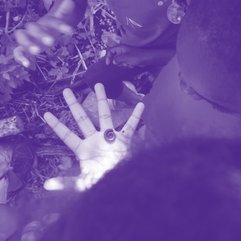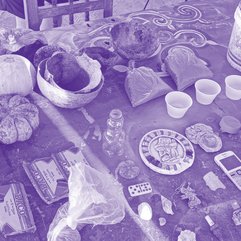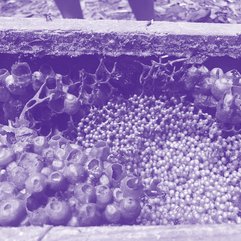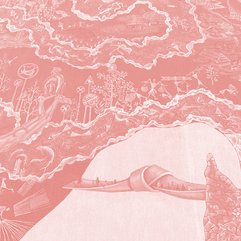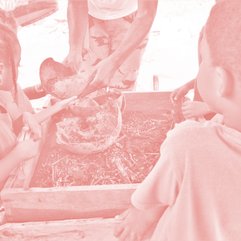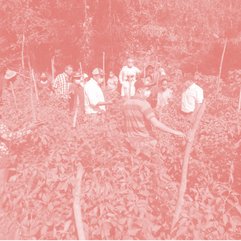Of Land Devourers and Those Who Hold Back the Fall of the Sky
A community exchange with panels, workshops, performances, and films on ecocide, collective mourning and the defense of the web of life.
18.00-20.00
10.00-22.00
10.00-21.00
Save the Date
all ages welcome
in English

The events of the weekend are open to all those interested. You do not need to register beforehand, but you can sign up for the different workshops on site.
This event borrows its title from the Yanomami shaman and Indigenous thinker Davi Kopenawa, who just weeks ago shared his story at Spore Initiative – of how the experience of the violent destruction of the Amazon, and the refusal to mourn members of his family who were killed by the so-called progress of the white man, has turned into a lifelong struggle against the "land-devourers who destroy everything". A fight for the preservation of the Amazon and the Indigenous communities living in it.
Kopenawa is one of many voices that highlight how climate breakdown, deforestation, land grabbing by industrial agriculture and the often-violent extraction of "raw materials" do not affect us all equally. It is primarily poor and marginalized communities that are most affected by the devastating impacts of climate breakdown, environmental degradation, and neo-colonial forms of extraction, whose livelihoods are destroyed and who are forced to flee. Not only are these communities known to contribute the least to the poisoning of soils, atmosphere, and water, but they often play an essential role in stewarding the diversity of the web of life as protectors of forests, rivers, and seeds.
While in many Indigenous cosmologies and practices, the relation to nature is understood as a form of kinship, capitalism declares it to be an inanimate resource, something that can and must be exploited without restraint. The destruction of nature, as well as the concomitant destruction of the livelihoods of communities that inhabit the earth in a different, less destructive way, is often accompanied by an absence of grief. In the case of both ecocides and genocides, it becomes clear that the "imperial ways of life" of the Global North place different values on life, often along racist lines. However, the denial of collective mourning for the sacrificed lives and ways of life is an essential starting point for solidarity and resistance.
We have therefore invited groups, initiatives, artists, and care workers with whom we have collaborated in recent months or who have worked in the Spore House to explore the relationship between ecocide, collective mourning, and resistance.
Through the weekend’s offerings of talks, workshops, performances, and screenings we trace the threads between mourning and the defense of life. How can we mourn together? And how can grief become a driving force for our actions?
Friday 15 November
6 pm: The Forgotten Migrant
Film Screening presented by FACQ, International Women Space and Dept for Climate
Language: English and German
Film: The Forgotten Migrant (2021, 52’)
Director: Richard Djimeli Fouofie
A political activist, who works in the quarry, a fisherman, forced into a new business model by climate change, a chicken farmer without chickens and a cloth merchant without customers - between internal migration and the dream of Europe, they are all looking for better prospects in their own way. With the portraits of these four migrants in Mali, the documentary highlights the effects of climate change and the influence of the EU border regime on mobility in West Africa.
The film screening will be followed by a panel discussion with:
Djif Djimeli: film director and member of Afrique-Europe-Interact, a collective that supports refugees and migrants in their struggles for freedom of movement and equal rights, including the right to stay, i.e. the opportunity to lead a life in the country of origin under safe, dignified and self-determined conditions.
Llanquiray Painemal: Mapuche migrant woman, active in Berlin for social justice and for the dissemination and visibility of the anti-colonial struggle in Wallmapu. She is also part of the Respect Berlin collective, which fights for the rights of illegalized migrant women in paid reproductive work.
Kahbit Ebob Enow: facilitator and mediator, activist for social justice, and project manager for Black organizations in Berlin.
Rose Wanjiku (moderator): climate and social justice activist based in Berlin. She is part of International Women* Space and several climate justice collectives in Berlin that dive into the intersectional links climate, feminism, self-determination, and decoloniality.
– – – – – – – – – – – – – – – –
Saturday 16 November
10:00 am: Conversation with Mama D and Siegmar Zacharias on Collective Grief
Language: English
Mama D and Siegmar Zacharias work with our relationships to food and medicinal plants, and on forms of collective mourning in connection with colonialism and genocide. In this conversation, we will explore their practices and experiences working with communities in Berlin and in the UK.
Mama D Ujuaje works as a Community Researcher and Facilitator whose background is in nourishment praxis and embodied and art-based advocacy towards Socially Transformative Justice. She currently curates Learning Journeys within community centered knowledge, exploring the internal interfaces and edges of community, legacies of colonialism/coloniality and modernity which is constituted by these power structures and systems of justice.
“The earth is quaking and our hearts are breaking in the face of genocide, ecocide and other layers of brutality”. How can we hold these multiple grieves collectively and recognize their different natures? How can we develop collective grieving practices that will support us moving with grief rather than trying to overcome it? This is what Siegmar Zacharias is asking in her work. Siegmar Zacharias studies traditional plant medicine and is a performance artist and researcher, as well as a trained death doula. At the intersection of art, radical pedagogy and activism, she works collaboratively, learning from grieving.
On November 2nd Mama D holds a Necroproximal Space recognizing loss and grief through embodied practices at Spore, for members of the African diaspora.
– – – – – – – –
11:30 am: Water Bodies: A Conversation on Water, Gender and Political Agency
With Özge Yaka, Lotta Schäfer and voices from and beyond Water Bodies - Wasserspiegel.
Language: English
This conversation format engages with the Wasserspiegel–Water Bodies exhibition by bringing the voices of women fighting for rivers in Turkey’s East Black Sea region into conversation with voices presented by the exhibition and positions within the audience.
By attending to women’s embodied, sensory, and affective connections with river waters, the conversation will demonstrate how bodily memory and emotions mediate the relations between gender, water, and political activism in the more-than-human lifeworld of East Black Sea women. Coming together will provide us with an occasion to contemplate possible connections between water bodies - “not only rivers, lakes, puddles, and seas” but also those who are connected to them, those who care about them, those who experience them not only as natural resources but as life companions. How can we center those bodies to connect human and more-than-human connections with political agency?
– – – – – – – –
1:00 pm: Food and Rest
Soup prepared by Fatma Savun
– – – – – – – –
2:00 pm: Workshop Sessions
Decolonial Storytelling towards a Radical Ecological Imagination
With Rosa Cordillera A. Castillo (Uni Bremen), Jorge Vega (HU Berlin)
Language: English
Stories are important for building and transmitting knowledges, particularly as a source of other ways of knowing and being. They can open spaces for corporealities and experiences which are structurally marginalized and become a place of encounter to see each other beyond the dominant gaze. Storytelling is not only a way of knowing the world; it is also a practice of making the world. It is thus a critical methodology of world-building that is anchored on working alongside and with those whose knowledges have been silenced and excluded. Crucial in the power of storytelling is its imaginative and affective force that shape people's understandings, perspectives, and attitudes towards the present and future. Taking this decolonial potential of storytelling, environmental defenders share their stories with a younger generation of students and climate activists. The focus will be on the affective dimension of their lived experiences as environmental defenders, of ecological grief that is channeled towards transformative hope, and of decentering Eurocentric ecological anxieties and hopelessness, towards opening horizons for a radical ecological imagination.
Environmental Racism in Berlin: Past and Present Realities
Workshop with Nary Götze (Climate Justice Berlin Collective)
Language: German and English
This two-hour workshop explores the deeply rooted problem of environmental racism in Berlin. We will highlight the historical continuities of the city that have shaped the current landscape of environmental injustice. Through analysis of maps and group discussions, we will draw connections to the intertwined forms of discrimination. Together we will place the complexity of Berlin in a broader international perspective and explore political movements that have shaped the struggle for environmental justice. We will also talk about future prospects that go beyond existing systems.
The workshop is aimed exclusively at BIPoC participants.
Quaking in Kinship - Plants as Companions, Allies and Guides for Collective Grief and Transformation
Workshop with Siegmar Zacharias
The earth is quaking and our hearts are breaking in the face of genocide, ecocide and other layers of brutality. How can we hold these multiple grieves collectively and in their difference? How can we develop collective grieving practices that will support us moving with grief rather then trying to overcome it. Doing this collectively we keep weaving threads of life and death together, pain, anger, sadness, joy and interconnection. Valuing the knowledges and resources stored in our bodies and lands we will make medicine together as a decolonial practice of resistance against structural violence.
Drawing from knowledges passed down from Romanian aunts and great-grandmothers, we will meet Angelica and Ivy, make a salve together and explore how they can be companions, guides and allies, addressing both the individual and the social body to support collective grieve, struggles and regeneration.
Reflecting Whiteness – Conscious Privilege
A workshop with Fanny Nitsche und João Albertini
Language: German
Fanny Nitsche examines concepts of critical whiteness and invites the participants to find a language to talk about it.
When did you first realize that you are white? What does it actually mean to be white - as a thought, as a concept, an action, and as a privilege? How do we get to the bottom of our own racist imprint and how can we break with it? In this workshop, we want to look at whiteness as a power structure and understand together what violence emanates from it. We will go on a quest together to learn about our whiteness and how this shapes us in our everyday lives and in the institutions in which we operate. Whiteness as a position of power is usually unnamed and we often find it difficult to find words for it and to name what this positioning does to us. How can we find a language to talk about it and support each other to be allies for people affected by racism?
Militarized Landscapes and Resistant Ecologies
with Gabriela Manda Seith and Munira Khayyat (remote)
Language: English
While the immediate deadly danger posed by landmines and unexploded ordnance is obvious, the consequences for the entire ecosystem usually remain hidden. When they corrode, are removed or explode, toxic substances such as mercury, nickel, lead and the explosive TNT seep into the soil and reach microorganisms, plants and groundwater. In the workshop we will explore how it is possible to highlight the connections between war, landmines, unexploded ordnance and their effects on various plants and species from an artistic, activist and anthropological perspective. In doing so, the focus is not only on the destructive effects of landmines and unexploded ordnance, but also on the resilience that arises in resistance to its deadly substances. How do living beings find ways to resist explosive objects? How do landmines expand the habitat for some wildlife while making it inaccessible to humans? How do landmines in turn become dangerous for other wildlife? How can we listen to the communication of plants to identify mines, regenerate landscapes and make them a place of biodiversity and coexistence between different species again?
– – – – – – – –
5:10 pm: Baroque ethos or “Saying yes to life until death”, with Iván Carrasco Andrés from Calaca e.V.
Calaca e.V. celebrated the Día de los Muertos at Spore and set up an ofrenda to commemorate the deceased. In a presentation of the altar, Iván Carrasco Andrés explores the question of whether it is even possible to affirm life under conditions in which death is omnipresent. The affirmation of life even in the face of death (as in genocidal and colonized contexts) has produced a particular cultural expression in Latin America that can be understood as a “baroque ethos”. So, what does it mean to “say yes to life until death” and what does all this have to do with Día de los Muertos, capitalism and resistance to colonialism? What was the survival strategy in Latin America to assert life in the midst of violence and barbarism?
– – – – – – – –
5:30 pm: Collective Presentation of Workshop Outcomes
– – – – – – – –
6:30 pm: Broken Times
Perfomance by rezzan gümgüm
When mourning is suppressed, neither the confrontation of pain nor the process of healing can occur. The normalization of violence and oppression deprives communities of their right to collective mourning, leading to a fractured sense of time. This performance explores both the individual and societal dimensions of suppressed grief, questioning the invisibility of pain and the normalization of violence against both nature and human beings.
– – – – – – – –
7 pm: En el nombre del litio
(2021, 75’)
Directors: Cristián Cartier Martín Longo
Film screening presentend by SoliSur
Language: Spanish with English subtitles
En el nombre del litio is a documentary on the impact of Lithium extraction by multinational mining companies on Indigenous communities in Argentina. The film shows the voices and of the communities that inhabit the salt flats and their fight against the mining companies, as well as the concern for the environmental impact generated by the extraction of lithium in one of the biggest reserves in the world. This documentary reflects the conflict between the worldview of the Indigenous communities and the Extractivist attempts to find an alternative to fossil fuels in lithium, destroying Indigenous traditions and creating a “sacrifice zone”.
– – – – – – – – – – – – – – – –
Sunday 17 November
10:00 am: An Omnicide Continuum
A panel with Sheena Aderson, Aurélia Kalisky, Tamar Novick, moderated by Rosa Cordillera A. Castillo
Language: English
Human and more-than-human lives are both impacted by coloniality's radical dualism as seen in the opposition between nature (as object) and the human (as subject), and thus the ensuing exploitative relation to the natural world. In what ways do environment and multiple forms of subjugation shape one another? How are these interrelations (not) tackled in public, legal, and academic discourse, and what forms of resistance exist against human and more-than-human harm? This panel will address these historic injustices, and the violence inherent in a vista of a world-as-resource.
– – – – – – – –
11:30 am– 4:30 pm: Workshops including Lunch Break
Food by Fatma Savun
Somatics, Grief and Repair as Foundations to Justice
Collective care session with somatic practitioners Day Eve (11.30 am -1pm) and hugo-huga x tibiriçá (2-4pm), facilitated by Climate Justice Berlin Collective
In this session, we will promote a space for participants to collectively rest and connect through body work, massage and somatic practices. Too often, collective rest and care are neglected or viewed as a privilege, also in activist spaces. In this time of extreme violence, wars, ecocides and genocides, we call on the power of being in community with each other. Our bodies and nervous systems are fighting long-term struggles for liberation and justice, and they depend on each other - so let’s take care of them/us together! Every_body is welcome!
Solidarities in/and Necropolitics
Workshop facilitated by Mihir Sharma (University of Bremen)
Language: English
In 2019, UN Special Rapporteur Phillip Alston claimed that the world is increasingly at risk of climate apartheid. Climate apartheid is a term many scholars, activists, and policymakers have used to describe the ways in which the unequal effects of climate change would be distributed, managed, and experienced. The ‘Wretched of the Earth’ have disproportionately suffered the devastating impacts of climate change while contributing almost nothing to cause it. Climate justice advocates thus impel an ethical challenge: to address the asymmetrical relations and planetary responsibilities which ensue from this injustice, and strive to undo these forms of injustice in future-making.
This workshop will address the following question: How, then, do various actors imagine, enact, and enable solidarities across border regimes, policy cycles, and immediate concerns and relations?
Popular Struggles Against Extractivism in Abya Yala
Workshop facilitated by Gustavo Hernández-Calderón, María Fernanda Vilaseca, Nicolás Gómez Herrera and Carol Turizo presented by SoliSur.
Language: English
The workshop will be held in relation to the screening of En el nombre del Litio on Saturday. This second part analyzes the popular struggles from Bolivia, Argentina, and Chile against the extractivist project that once again puts the territory of Abya Yala as a colonized subject; as well as the alternatives to the green capitalism that the Global North proposes: Resource nationalism, degrowth and eco-socialism. In this way, participants will be provided with tools to analyze the complexity of the situation in the territory and to identify possible alternatives, alliances, or perspectives of solidarity with the resilient communities. Thus, SoliSur aims to propose Spore and its event as a meeting place not only to raise awareness of the current issues in Abya Yala but also to collectively envision alternative futures through potential alliances committed to social and environmental justice.
From the Indigenous Artsakh Flatbread to COP29: Discussing Ecocide, Genocide and Wealth Inequality as Faces of the Same Evil
Facilitated by Ararat-Kollektiv
Language: English
In this interactive workshop, participants will explore the absurdity of Azerbaijan hosting COP29 and the deep-rooted hypocrisies within the institution of COP generally, especially their failure to address intersectional issues of ecocide, genocide, and wealth inequality. Through the lens of the recent Artsakh genocide and Azerbaijan’s greenwashing, we will unpack how global powers, and the United Nations turn a blind eye to violence under the guise of diplomacy and climate policy. We will also discuss Azerbaijan’s role as a perpetrator of both environmental and human devastation, focusing on its expansionism and its use of historical revisionism, caviar diplomacy, Armenophobic propaganda and the educational system, among other tools. Participants will engage in these critical conversations while making an Indigenous Artsakh flatbread, grounding the discussion in Armenian Indigeneity, resistance, and connection to land and nature.
– – – – – – – –
4:30 pm: Collective Presentation of Workshop Outcomes
– – – – – – – –
5:30 pm: TERRITORIES OF KNOWLEDGE: from Belém to Berlin.
Moving lenses towards COP-30 in 2025, in the Brazilian Amazon.
Panel with Barbara Marcel, Camila Nobrega and representatives of collectives based in Brazil.
Language: English
Next year, the United Nations Climate Change Conference, COP-30, will happen in Belém, an urban part of the Amazon Forest. The region is once again in the spotlight, full of expectations and projections of potential legacies. What are the issues at stake and how do they connect with transnational urgent debates? What does the conference mean for people based in Belém, and for international networks proposing a critical lens on colonial and developmentalist visions of the Amazon?
In this panel, filmmaker and artist Barbara Marcel and transmedia journalist and researcher Camila Nobrega will speak about the project TERRITORIES OF KNOWLEDGE: from Belém to Berlin, born between borders and gazes from critical dimensions on colonization, focusing on the different modes of production of images, discourses and narratives, as well as the unequal hierarchies of power and knowledge in international processes related to the debate on social-environmental and climate crises.
During a research residency in collaboration with Spore, conducted firstly in Belém, with a second research phase in Germany, the project follows some of the processes of preparation for COP-30. Based on methods of artistic practices and investigative journalism, combined with processes of articulation between communicators, the project intends to contribute to spaces for knowledge exchange between collectives in the two countries before the UN encounter. The panel focuses on the role images and discourses play in the dispute over narratives within and around the COP30. We want to open up a space for sharing on possible alliances and strategies to strengthen critical practices and horizontal mutual learning––using cultural and media tools as forms of collective organizing and public awareness. The panel will have live online participation from representatives of collectives based in Brazil.

 Botadero Verde
Botadero VerdeFrom the longtime photo project Canary in a Garden / Pueblos Espejos by Marvin Systermans on Neo-extractivism in the case of the largest coal-mine in Latin America: El Cerrejón in Colombia.
Botadero verde
El Cerrejón is the largest open cast coal mine in Latin America and located on Indigenous land in the La Guajira region. For every expansion of the mine communities are relocated and ecosystems destroyed. The cleared soil from the mine is deposited in huge heaps. On its contaminated soil only few plants can survive which is why despite its green appearance the landscape documented in this photograph is a wasteland. When rain falls it runs through the heap forming lakes of wastewater below, which then end up unfiltered in rivers and groundwater.
This is only one example of the devastating impact extractivism is having on the region, its people and ecosystems. Glencore, the world's largest commodity trader that runs the El Cerejón mine, denies any connection between its activities and reported cases of people living near the mine falling sick. The company even uses images of these green heaps as proof of the company’s effort to restore what has been lost at their hands.




